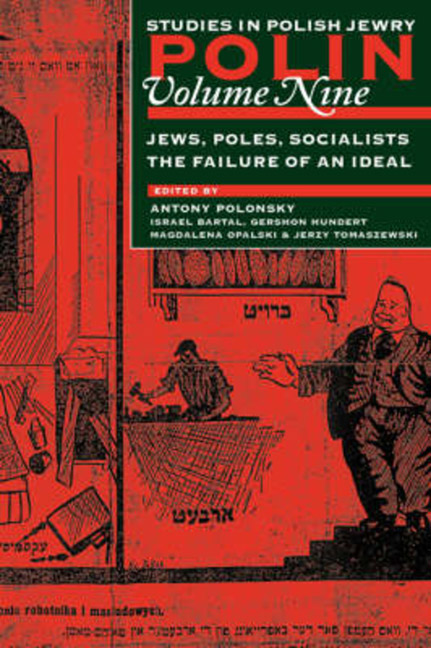Book contents
- Frontmatter
- Dedication
- Editors and Advisers
- Preface
- Acknowledgement
- Polin
- Polin: Studies in Polish Jewry
- Contents
- Note on Transliteration, Names, and Place Names
- Abbreviations
- Introduction
- PART I POLES, JEWS, SOCIALISTS: THE FAILURE OF AN IDEAL
- PART II NEW VIEWS
- PART III REVIEWS
- REVIEW ESSAYS
- BOOK REVIEWS
- Alfred Ebenbauer and Klaus Zatloukal (eds.), Die Juden in ihrer mittelalterlichen Umwelt
- Rivka Schatz-Uffenheimer, Hasidism as Mysticism
- Jadwiga Maurer, ‘Z matki obcej … ’
- Władyslaw T. Bartoszewski and Antony Polonsky (eds.), The Jews in Warsaw
- Maria Klańska, Problemfeld Galizien in deutschsprachiger Prosa 1846-191
- Israel Oppenheim, Tenuat Heḥaluts bePolin, 1929-1939
- The Letters of Martin Duber, ed. Nahum N. Glatzer and Paul Mendes-Flohr
- Alexander Heider, A Dictionary of Jewish Surnames from the Russian Empire
- Alice L. Eckardt (ed.), Burning Memory
- Ruta Sakowska, Ludzie z dzielnicy zamkniętej
- lwona Irwin-Zarecka, Neutralizing Memory
- Stanislaw Meducki and Zenon Wrona (eds.), Antyzydowskie wydarzenia kieleckie, 4 lipca 1946
- Bibliography Of Polish-Jewish Studies, 1993
- Notes on Contributors
- Notes on Translators
- Glossary
- Index
Alice L. Eckardt (ed.), Burning Memory
from BOOK REVIEWS
- Frontmatter
- Dedication
- Editors and Advisers
- Preface
- Acknowledgement
- Polin
- Polin: Studies in Polish Jewry
- Contents
- Note on Transliteration, Names, and Place Names
- Abbreviations
- Introduction
- PART I POLES, JEWS, SOCIALISTS: THE FAILURE OF AN IDEAL
- PART II NEW VIEWS
- PART III REVIEWS
- REVIEW ESSAYS
- BOOK REVIEWS
- Alfred Ebenbauer and Klaus Zatloukal (eds.), Die Juden in ihrer mittelalterlichen Umwelt
- Rivka Schatz-Uffenheimer, Hasidism as Mysticism
- Jadwiga Maurer, ‘Z matki obcej … ’
- Władyslaw T. Bartoszewski and Antony Polonsky (eds.), The Jews in Warsaw
- Maria Klańska, Problemfeld Galizien in deutschsprachiger Prosa 1846-191
- Israel Oppenheim, Tenuat Heḥaluts bePolin, 1929-1939
- The Letters of Martin Duber, ed. Nahum N. Glatzer and Paul Mendes-Flohr
- Alexander Heider, A Dictionary of Jewish Surnames from the Russian Empire
- Alice L. Eckardt (ed.), Burning Memory
- Ruta Sakowska, Ludzie z dzielnicy zamkniętej
- lwona Irwin-Zarecka, Neutralizing Memory
- Stanislaw Meducki and Zenon Wrona (eds.), Antyzydowskie wydarzenia kieleckie, 4 lipca 1946
- Bibliography Of Polish-Jewish Studies, 1993
- Notes on Contributors
- Notes on Translators
- Glossary
- Index
Summary
For more than twenty years the Annual Scholars’ Conference on the German Church Struggle and the Holocaust, meeting in different parts of the United States, has provided one of the main opportunities for discussion and dialogue between Jewish and Christian scholars concerned with the legacy of these events in today's world. More recently, some of the findings of the conferences have been printed, put out by a variety of publishers under some sufficiently unifying title. But since there is now a plenitude of such anthologies, such as those issued by the Simon Wiesenthal Center or the Millersville Annuals, the reader interested in any particular subject, such as Polish-Jewish relations, needs to maintain a careful system of cross-reference; otherwise individually valuable contributions can easily get lost.
This particular collection of articles, edited by Alice Eckardt, is part of the continuing debate about how the events of the Holocaust can be remembered, or more appropriately made relevant to younger generations. Surviving participants, whose numbers are now necessarily diminishing, are joined by professional scholars, mainly historians and theologians, in depicting both the necessity and the difficulty of recalling the tragedies of fifty years ago. Particularly notable are the personal testimonies of three survivors, all young girls at the time. Frieda Aaron from Poland, who was incarcerated in three concentration camps, recalls how the spiritual resilience of the Jewish prisoners was both an enabling and an ennobling factor in challenging the dehumanizing brutality of the ghettos and camps. Renate Bethge, living in middle-class Berlin, was forced to face the fact that her father and three uncles, one of them being Dietrich Bonhoeffer, were murdered as traitors by the Gestapo, and describes how she has subsequently taken up the cause of making Germans come to terms with their guilt. Nechama Tee survived by disguising herself as a Catholic, and was protected by a family of poor Polish labourers, a fact which has led her to write notable books about the compassion and altruism shown to some Jews despite all the dangers.
Such compassion, Ms Tee believes, was an individual, even unpredictable, response, and often came from people classified in Poland as socially marginal.
- Type
- Chapter
- Information
- Jews, Poles, Socialists: The Failure of an Ideal , pp. 295 - 296Publisher: Liverpool University PressPrint publication year: 2008

